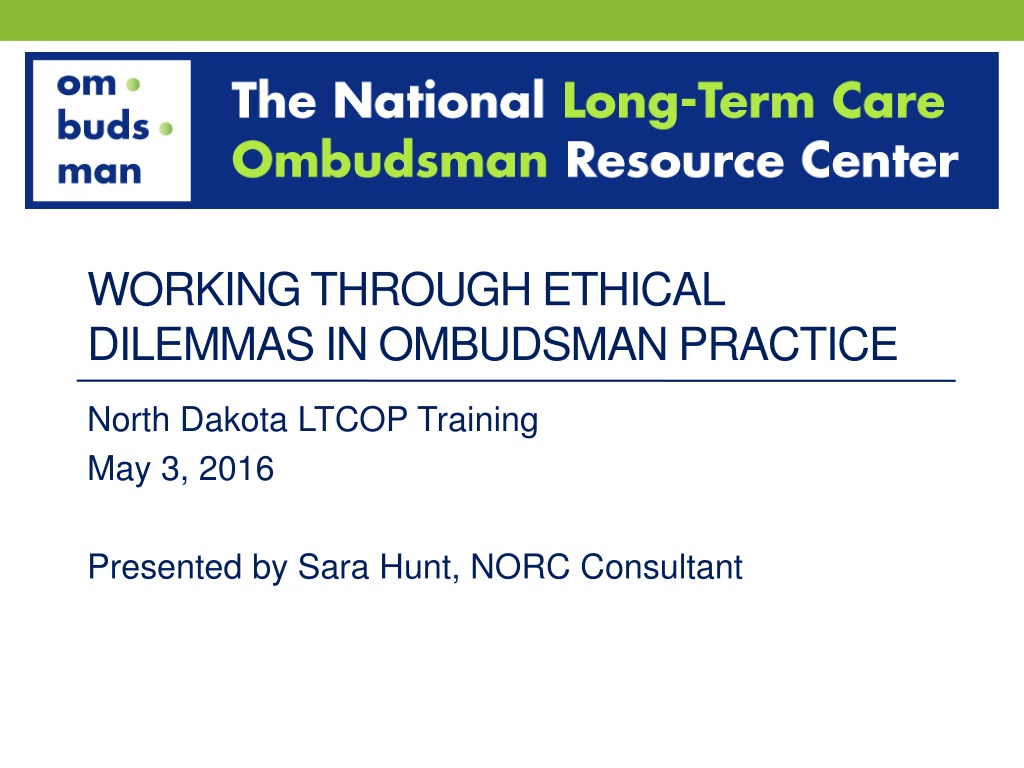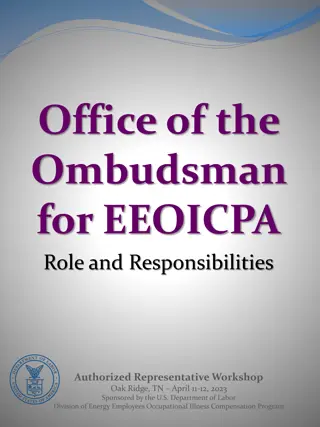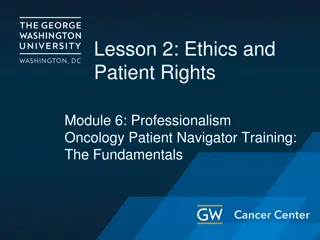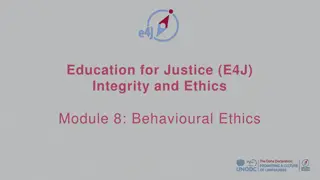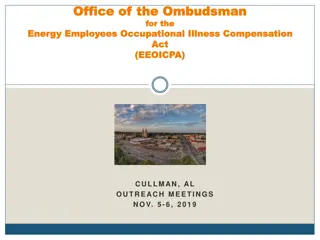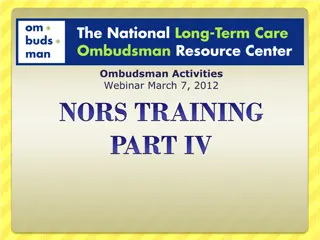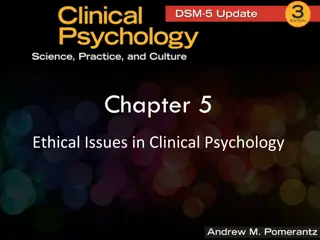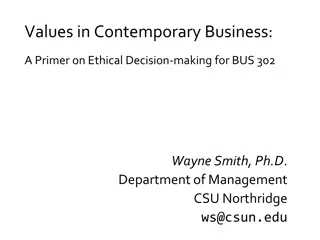Ethical Decision-Making in Ombudsman Practice: Key Aspects and Code of Ethics
Explore the essential elements of ethical decision-making in Ombudsman practice, including the LTCO Code of Ethics, maintaining credibility, and supporting vulnerable individuals. Learn how to navigate ethical dilemmas and uphold integrity in serving clients effectively.
Download Presentation

Please find below an Image/Link to download the presentation.
The content on the website is provided AS IS for your information and personal use only. It may not be sold, licensed, or shared on other websites without obtaining consent from the author. Download presentation by click this link. If you encounter any issues during the download, it is possible that the publisher has removed the file from their server.
E N D
Presentation Transcript
WORKING THROUGH ETHICAL DILEMMAS IN OMBUDSMAN PRACTICE North Dakota LTCOP Training May 3, 2016 Presented by Sara Hunt, NORC Consultant
Learning Goals Know key aspects of ethical decision-making Know how to apply LTCO Code of Ethics Have a set of questions to apply to stay grounded in the LTCO role Know how the LTCOP Rule supports an ethical approach in complaint processing
What is ethics? A set of moral principles a theory or system of moral values the principles of conduct governing an individual or a group a guiding philosophy Merriam-Webster online dictionary
Code of Ethics for Ombudsmen LTCO work is filled with ambiguity Client/resident characteristics Right or Wrong courses of action unclear Need to maintain credibility and work with integrity Code of Ethics guides actions
Code of Ethics for Ombudsmen What are some of the provisions in these codes? Provides services with respect for human dignity and the individuality of the client, unrestricted by considerations of age, social or economic status, personal characteristics, or lifestyle choices. Respects and promotes client s right to self-determination. Makes every reasonable effort to ascertain and act in accordance with client s wishes. Acts to protect vulnerable individuals from abuse and neglect. Provides professional advocacy services unrestricted by his/her personal belief or opinion. Acts in accordance with the standards and practices of the LTCOP. Conducts self in a manner that will strengthen the statewide and national ombudsman network.
Doing Ethics Ethics is about the process as well as what you do. It is about how you get there. Good ethics begins with good facts. There is always a range of morally acceptable actions. Jacqueline Glover, 2001 presentation to LTCO
Decision-Making Capacity Is questioned when the decision someone makes differs from what professionals would choose. Joan McIver Gibson, 1991 Tip: When someone tells you why you can t trust or believe what a resident is saying, ask yourself why.
Principles for Decision-Making Informed consent and autonomy Substituted judgment Best interest
1327.19 Duties of the representatives (b) Complaint processing. (1) With respect to identifying, investigating and resolving complaints, and regardless of the source of the complaint (i.e. complainant), the Ombudsman and the representatives of the Office serve the resident of a long-term care facility. The Ombudsman or representative of the Office shall investigate a complaint, including but not limited to a complaint related to abuse, neglect, or exploitation, for the purposes of resolving the complaint to the resident s satisfaction and of protecting the health, welfare, and rights of the resident. [1327.19 (b)(1)] Including residents that are unable to communicate informed consent and do not have a representative (b)(2)(iii)
1327.19 Duties of the representatives (b) Complaint processing. (2) Regardless of the source of the complaint (i.e. the complainant), including when the source is the Ombudsman or representative of the Office, the Ombudsman or representative of the Office must support and maximize resident participation in the process of resolving the complaint as follows: (i) Privacy (ii) The Ombudsman or representative of the Office shall personally discuss the complaint with the resident (and, if the resident is unable to communicate informed consent, the resident s representative) in order to:
1327.19 Duties of the representatives (b) Complaint processing. (2) (A) Determine the perspective of the resident (B) Request the resident to communicate informed consent in order to investigate the complaint; (C) Determine the wishes of the resident with respect to resolution of the complaint, including whether the allegations are to be reported and, if so, whether Ombudsman or representative of the Office may disclose resident identifying information or other relevant information to the facility and/or appropriate agencies. (D) Advise the resident of the resident s rights;
1327.19 Duties of the representatives (b) Complaint processing. (E) Work with the resident to develop a plan of action for resolution of the complaint; (F) Investigate the complaint to determine whether the complaint can be verified and (G) Determine whether the complaint is resolved to the satisfaction of the resident Person-Centered complaint processing The OAA and the LTCOP Rule are clear Role of the LTCO is to support informed consent, substituted judgment (resident representative), best interest.
1327.19 Duties of the representatives (b) Complaint processing. Ombudsman program MAY disclose resident-identifying information under some circumstances: No one available to communicate consent or resident representative has taken action to harm resident; Reasonable cause to believe that an action may adversely affect the resident s health, safety, welfare, or rights; No evidence that resident would not wish a referral; Reasonable cause to believe a referral is in residents best interest; AND Ombudsman approval (or otherwise follows Office policies) 45 CFR 1327.19(b)(6), (7)
Tips for LTCO Practice Conflicts usually arise over the application of values, instead of over the values themselves. Values emerge from relationships. Values may evolve and change depending upon who s involved in the conversation.
LTCO Action Identify individuals to be involved in the conversation with the resident when conflicts arise. Be able to tolerate ambiguity. The key is the process used to sort out the options and arrive at a choice. Gibson, 1991 presentation to LTCO
Questions LTCO Ask in Dilemmas What harm will be prevented? What good will be done? What is the real issue? What needs to be known to make [assist] this decision? What are the client s/resident s questions or concerns? Joan McIver Gibson, 1991
LTCO Actions and Ethics Code of Ethics, OAA, LTCOP Rule Applying ethical concepts Identify situations for self-check What internal conflict am I feeling? Why? Whose interests am I representing? What if resident cannot express wishes? Have I taken reasonable actions to support resident decision- making? Have I followed LTCOP Policies? Will my actions support the credibility of the LTCOP as resident s advocate? How have I used my influence? Have I been honest with the resident and others?
Mrs. Irons The social worker at The Pines Nursing Facility calls and says the facility needs your help with a situation. A resident, Mrs. Julia Irons, is refusing treatment. Her doctor ordered a pureed diet and she refuses to continue eating it and insists that she wants a regular diet. Although she has a terminal illness she is not on hospice and she is mentally sharp, she can make her own decisions. Facility staff are concerned that she will aspirate and die if she eats a regular diet. Mrs. Irons says she is willing to take the risk in order to have food that tastes and looks like real food. Some of her family members support Mrs. Irons decision, others are strongly opposed. They take out their frustration on the staff who feel caught between upholding residents rights, complying with medical orders, and possibly contributing to Mrs. Irons death. Will you come and work out a solution?
Mrs. Irons 1. Who is your client? Why? 2. What are the ethical and values issues? 3. What actions would you take? 4. What questions or uncertainties might you have about your actions? 5. How would you know if you ve done the right thing?
CMS SOM 483.10(b)(4) The resident has the right to refuse treatment, 483.10(d)(3) The resident has the right to participate in planning care and treatment or changes in care and treatment. Interpretive Guidelines: Whenever there appears to be a conflict between a resident s right and the resident s health or safety, determine if the facility attempted to accommodate both the exercise of the resident s rights and the resident s health, including exploration of care alternatives through a thorough care planning process in which the resident may participate.
CMS SOM 483.20(k)(2) A comprehensive care plan While Federal regulations affirm the resident s right to participate in care planning and to refuse treatment, the regulations do not create the right for a resident, legal surrogate or representative to demand that the facility use specific medical intervention or treatment that the facility deems inappropriate. Statutory requirements hold the facility ultimately accountable for the resident s care and safety, including clinical decisions. Surveyor Probes: Was interdisciplinary expertise utilized ? b. Do the dietitian and speech therapist determine, for example, the optimum textures and consistency for the resident s food that provide both a nutritionally adequate diet and effectively use oropharyngeal capabilities of the resident?
Food and Dining Symposium 483.35(i) Nutrition (2) Receives a therapeutic diet when there is a nutritional problem. Receives a Therapeutic Diet Therapeutic diet refers to two kinds of diets: restricted diets and altered texture diets (such as mechanical soft or pureed). As might be expected, residents on a modified texture diet would also sometimes prefer a regular diet, which might put them at risk for choking. The Intent statement in the [CMS] interpretive guidance for this requirement currently states that care and services be consistent with the resident s comprehensive assessment and that the therapeutic diet takes into account the resident s clinical condition and preferences. The resident s personal wishes are acknowledged with the following: Goals and prognosis refer to a resident s projected personal and clinical outcomes. These are influenced by the resident s preferences. Tag F325 Nutrition guidance identifies that a person has dislikes, preferences and preferred portion sizes.
Food and Dining Symposium CMS F325 Deficiency Categorization The first instance is an example of Severity Level 4 - Immediate Jeopardy: Substantial and ongoing decline in food intake resulting in significant unplanned weight loss due to dietary restrictions or downgraded diet textures (e.g., mechanic soft, pureed) provided by the facility against the resident s expressed preferences.
Mrs. Delgado While you are visiting residents in Peaceful Shores Convalescent Facility, a resident, Mrs. Delgado shares that she is very scared. Last night a staff person told her that if she keeps using the call light she will be punished by being discharged from the facility. Mrs. Delgado is totally bedfast and needs assistance from staff for all of her daily functions. She has no other place to go. Mrs. Delgado tells you not to do anything to assist her because she fears retaliation and no one will be able to protect her.
Mrs. Delgado 1. Who is your client? Why? 2. What are the ethical and values issues? 3. What actions would you take? 4. What questions or uncertainties might you have about your actions? 5. How would you know if you ve done the right thing? 6. Would your actions change if Mrs. Delgado had cognitive impairments? If so, why? How?
LTCO Advocacy Explore the reason for the resident s reluctance, discuss her rights, the role of the LTCOP, the complaint process, and potential risks of not reporting the complaint. Offer to investigate without revealing her identity. Visit as frequently as possible, ask if she is interested in supportive services (e.g. counseling), and encourage her to give her consent to report the abuse. Leave the door open for her to change her mind. Ask if she has shared this information with anyone else. See if there are other residents with the same issue, very carefully. Gather information regarding the allegation and if you find information supporting the allegation share the information with the facility if it is possible to do so without identifying the resident (e.g. here is information supporting allegations we ve received that the nurse aide, Jackie, on the evening shift is ) and remind the facility of their responsibility to report and investigate abuse.
Touchstones: LTCO Role Responding to Abuse Complaints Person-centered complaint processing approach. Resolution goal= resident satisfaction and protection of resident s health, welfare and rights. LTCOPs are not the official finder of fact to substantiate abuse complaints. LTCO are not mandatory reporters, but LTCO must support the resident to the extent the resident wants assistance.
Technical Assistance Guide Responding to Allegations of Abuse: Role and Responsibilities of LTCO Overview Key Points AoA Statements What Can An Ombudsman Do? LTCO Advocacy Strategies Resources http://ltcombudsman.org/ uploads/files/issues/resp onding-to-allegations-of- abuse_0.pdf
The National Long-Term Care Ombudsman Resource Center (NORC) www.ltcombudsman.org The National Consumer Voice for Quality Long-Term Care (formerly NCCNHR) http://www.theconsumervoice.org/ This presentation was supported, in part, by a grant from the Administration on Aging, Administration for Community Living, U.S. Department of Health and Human Services.
